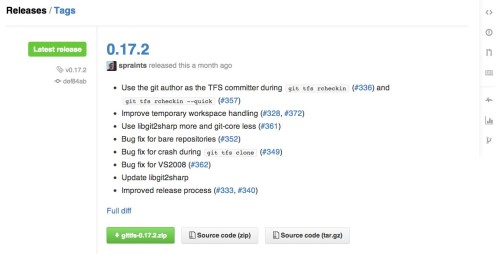I am loving GitHub code review so much that people are suggesting that I should change my title to Comparer of Unmerged Neglectable Technicalities. Otherwise known as … nevermind.
Tag: GitHub
GitHub’s Gist is like Instagram for coders.
GitHub’s Gist is like Instagram for coders.
GitHub adds Releases
By now you know that I can’t praise GitHub enough. It is one of the best tools for developers ever. Seriously. It’s up there with git itself, and even Vim. If you aren’t using it yet, stop whatever it is you are doing and rush there. Now. I’m not kidding.
So, anyways. Today GitHub added another awesome feature – Releases. These are basically git tags on steroids.
I’ve been already playing around with the idea of releases for our work projects. See, for example, phing-version branch of my sandbox repository. It worked, but it’s not perfect. With GitHub Releases however I’ll have pretty much everything I need – release notes, easy full diff reviews, binary attachments, etc.
A little side note for binary attachments: I mostly work with PHP, which doesn’t really need binary attachments. But I am a part of other, “heavier” projects, developed in C++ for example. This feature will come in handy. Also, as far as PHP goes, I was playing with the idea of using RPM and YUM as a mechanism for managing installation, upgrade, and downgrade process.
Back to GitHub Releases now. This is an excellent example of why you should use GitHub instead of setting up your own environment. You’ll waste more time and money. It will be ugly. And you’ll have to maintain it. With GitHub you’ll focus on your actual development work and will get excited every now and then when they add a new feature.
That sweet sweet moment when the company upgrades …
That sweet sweet moment when the company upgrades its GitHub plan. Hopefully, we’ll start pushing things into Open Source domain soon too.
GitHub’s Data Challenge II winners announced
GitHub, being a massive data store, is constantly looking for new and improved ways of extracting knowledge from its data.
In April we announced the second annual GitHub data challenge.
[…]
After receiving some amazing entries in the previous challenge, we were excited to see what people would discover with another year of data. The results blew us away: we saw many more entrants and novel applications of our data. GitHubbers ranked their favorite entries, and after tallying the votes, we’re happy to announce the top 3 entries for the 2013 GitHub data challenge.
The second place (Popular Convention by Outsider) and third place (open source contributions by location by David Fischer) winners are very nice. But the first place winner is truly amazing (The Open Source Report Card, by Dan Foreman-Mackey). It’s an excellent combination of data crunching with beautiful presentation. Of course, you’ll need some publicly visible repositories and contributions to see anything interesting, but once you do, it’s quite impressive. Have a look at mine, for example.
